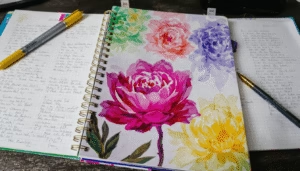“Gratitude” is derived from the Latin word “Gratia”, meaning graciousness, gratefulness, or grace. It can be defined as the quality of being thankful for what we have. In other words, it is simply taking time to remember all the positive things in your life. It is not necessary to tell anyone else about the blessings you have.
8 Ways to Practice Gratitude
Key Points:
- Definition and Importance of Gratitude: Gratitude derives from Latin ‘Gratia’ and is the quality of being thankful, which can significantly increase happiness and overall well-being through positive reflection on life.
- Physical and Mental Health Benefits of Gratitude: Practicing gratitude improves sleep, boosts energy, strengthens the immune system, promotes longevity, enhances mental health by activating brain regions associated with emotions, and releases happiness-related neurotransmitters like dopamine and serotonin.
- Impact of Gratitude on Social and Career Life: Expressing gratitude fosters better relationships, enhances pro-social behaviors, boosts self-esteem, improves friendship, and can make you a more effective manager and networker, thereby benefiting your career.
- Increased Spirituality and Reduced Materialism through Gratitude: Gratitude heightens spiritual awareness across religions and diminishes materialistic pursuits, contributing to greater happiness and well-being.
- Ways to Practice Gratitude Exercises: Methods include writing thank-you notes, mentally thanking others, praying, counting blessings, journaling, creating a gratitude jar or rock, and meditating on gratitude, all of which foster a grateful mindset.
Gratitude and practicing gratitude exercises are the most powerful ways of increasing happiness. There is no cost for expressing gratitude or practicing gratitude exercises. Several studies show many benefits of practicing these activities on your body, mental health, and life. These involve:
- Make you healthier.
- Increase your levels of energy.
- Improve your sleep.
- Boost your immune system.
- Let you live longer.
- Strengthen your positive emotions.
- Make you happier.
- Make you feel good.
- Help you reduce stress.
- Help you make friends.
- Boost your career.
- Increase self-esteem.
- Increase spiritualism.
- Reduce materialism.
- Improve decision-making.
- Increase goal achievement.
Gratitude and gratitude exercises improve your body’s health.
These improve your sleep by increasing sleep duration and quality and reducing the time required to fall asleep. In other words, these can help with insomnia, induce a relaxation response, and knock you out. Levels of gratitude exercises depend on the perspective of life and personality than on life situations. Energy levels in your body are increased by practicing gratitude exercises. These enhance mental and physical well-being, which increases the levels of energy.
The Immune system is also improved by expressing gratitude because it lowers stress and can help your body fight against illness effectively. Another benefit of these exercises is to let you live longer. Several studies have shown that pessimistic people live a few years shorter than optimistic people. The reason is that optimism is correlated with positive emotions that are linked to an extra few months or years on earth.
Step into the world of learning and personal growth with the Centre of Excellence!
Mental health is improved by gratitude and gratitude exercises.
The neuroscientific research on gratitude has shown that in the brain, the right anterior temporal cortex controls feelings of gratefulness. The hippocampus and amygdala are the two main sites that are activated with feelings of gratitude and regulate emotions, memory, and bodily functions. In the central nervous system, differences in the neurochemicals distinguish the individuals expressing more gratefulness or less.
Individuals who feel and practice more gratitude have a higher volume of grey matter in the right inferior temporal gyrus. Gratitude acts as a ‘natural antidepressant’. It produces a feeling of happiness that is linked with the level of neurotransmitters. Your brain releases dopamine and serotonin when you express gratitude. These are two important neurotransmitters that are responsible for your emotions. They immediately enhance your mood, making you feel happy.
Gratitude and practicing exercises also affect your social life.
These open the door to more relationships. According to a study published in Emotion, appreciation can help you win new friends. Friendship deepens by practicing gratitude exercises. Several other studies show that gratitude induces pro-social behavior. It helps others to solve their problems and makes you more likely to offer them emotional support. It helps you perceive kindness and makes you happier and more energetic, which are highly correlated with pro-social behavior. It makes you look good.
“Gratitude turns what we have into enough.” – Aesop
Another benefit of expressing gratitude is to boost your career. For example, in the case of a job that has a degree of public relations, these may become even more distinct and important. It can make you a more effective manager. A toolbox of skills is required for effective management; thus, timely, sincere, specific, and behavior-focused appreciation is often a more powerful method that can make you a more effective manager. Moreover, it helps you network because it helps you get benefactors, mentors, and proteges. Mentoring relationships are developed when you are more grateful and help others. Gratitude also helps your decision-making and achieving your goals.
Happier Hour by Cassie Holmes
Ever wondered how to squeeze more joy from each day? Enter the Happier Hour book by Cassie Holmes! With a witty flair, Holmes teaches us that the secret to happiness is not in the quantity of time, but in the quality of our experiences. Who knew optimizing our hours could be this fun?
Self-esteem is also enhanced by expressing gratitude and practicing gratitude exercises.
The reason is that in most studies, it has been shown that gratitude makes people kinder and more friendly, increases their recognition of benevolence, and makes them feel better about themselves; thus, they have more social capital.
“Gratitude is not only the greatest of virtues, but the parent of all others.” – Marcus Tullius Cicero
Spiritualism is increased by gratitude because almost all major religions espouse gratitude as a virtue. Thus, grateful behavior spontaneously gives rise to spirituality. In addition to this, it reduces materialism. In multiple studies, it has been shown that the pursuit of wealth and power is a highly inefficient method of increasing well-being and happiness. In other words, material success is not a very essential factor in the happiness of highly grateful people.
Ways to practice gratitude exercises
There are some ways to express gratitude and practice gratitude exercises or activities. These involve:
- Write a thank-you note.
- Thank someone mentally.
- Pray
- Count your blessings.
- Journaling
- Gratitude Jar
- Gratitude Rock
- Meditate with gratitude.
1. Write a thank-you note
When you like the work of someone, you may write a thank-you note. This can make you happier and nurture your relationship with another person.
2. Thank someone mentally
If you have no time to write down, you can just think about someone who has done something nice for you and mentally thank the individual.
3. Pray
You may say a prayer to religious people. This is another way to express gratitude.
4. Count your blessings
This is the way to make yourself happy, confident, and special. Pick a time every week and count your blessings. You may write something specific and think about the sensations you felt when something good happened to you.
5. Journaling
This is another way to practice gratitude in which you can write down a few things you are grateful for. The benefit of journaling is not only to focus on the wonderful things, but it can also increase your quality of sleep, decrease symptoms of sickness, and increase joy.
6. Gratitude Jar
This practice requires some ingredients like a jar, glitter, a ribbon, stickers, or whatever else you like to decorate the jar, paper, and a pencil for writing your gratitude notes.
7. Gratitude Rock
This practice involves the rock. It is a symbol and a physical object you can use to remind yourself of what you have. To practice it, just find a rock and carry this rock around in your pocket. Whenever you touch it, pause to think about at least one thing you are grateful for, which will make you happier.
8. Meditate with gratitude
Two wellness practices, gratitude expression and meditation, can increase your happiness. In typical meditation, you keep your mind clear, while gratitude meditation involves concentrating and reflecting on being grateful for everything in your life, like meditating on the happiness that the good things in your life bring.
Step into the world of learning and personal growth with the Centre of Excellence!
References:
- Algoe, S., J. Haidt, & S.L. Gable. “Beyond reciprocity: Gratitude and relationships in everyday life.” Emotion 8, no. 3 (2016): 425-429.
- Ryff, C. D., Singer, B. H., & Dienberg Love, G. (2004). Positive health: connecting well–being with biology. Philosophical Transactions of the Royal Society of London. Series B: Biological Sciences, 359(1449), 1383-1394.
- Hollie, B. “Gratitude and the Feedback Loop.” Hollie B. & Institute for Self-Crafting. Instituteforselfcrafting.com.
- Plante, Thomas G. & Allen C. Sherman. “Faith and Health: Psychological Perspectives.” New York, NY: The Guilford Press (2001).
- “The Health Benefits of Gratitude: 6 Scientifically Proven Ways Being Grateful Rewires Your Brain + Body for Health.” Conscious Lifestyle Magazine. Consciouslifestylemag.com.
Body, Mind, And Soul For A Fulfilled Life!






